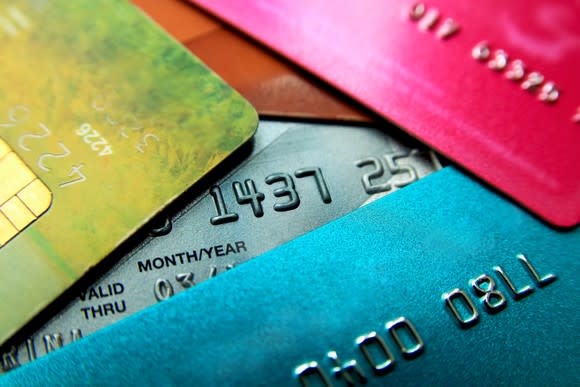Why the Average American Has Thousands in Credit Card Debt
The U.S. economy may be bouncing back nicely, but way too many households still struggle every month just to keep up with the bills. If your expenses are greater than your income, the inevitable result is ever-mounting debt -- usually on credit cards. Indeed, a recent LendingTree survey found that 42% of Americans who are carrying credit card debt got into debt in the first place while simply trying to make ends meet.
And that's just one of the common reasons why people end up in debt that they can't pay off. Luckily, you can escape this financial trap by rebalancing your income and expenses.
Balancing your household budget
Having to turn to credit cards to pay your regular monthly expenses means you'll be trapped in an endless cycle of ever-growing debt. The only way to escape that cycle is to adjust your budget so that your expenses are no longer greater than your income.
The quickest way to free yourself from credit card debt is to make some short-term sacrifices that significantly reduce your monthly expenses. For example, if you currently buy lunch on workdays, try making your lunches at home instead and brown-bagging at least a few days a week -- this can save you a respectable chunk of cash over the whole month, even if you normally eat at McDonald's. You might also consider switching your cable or satellite package to a cheaper lineup, cutting back your cellphone plan to bare essentials, and getting serious about reducing your energy costs. Even though each of these tactics might only save you a few dollars a month, they'll add up quickly.
The first step in balancing your budget is to have a budget in the first place. Said budget doesn't have to be an ongoing thing; tracking your expenses for a month or two will be enough to uncover where your money is going. You may even identify a few painless ways to free up some income, such as canceling a subscription to a magazine that you're not reading anymore. Intuit's free Mint budgeting program can make the entire tracking process much easier and even comes in app form for Android and iOS devices.
Once you've sliced and diced your expenses, consider looking for ways to increase your income as well. For example, taking on a temporary part-time job or side gig in addition to your primary job can make paying off that credit card debt much easier. By addressing both sides of the budget equation, you'll pay off your debt far more quickly.

Image source: Getty Images.
Preparing for one-time emergency expenses
After excess monthly expenses, the most common causes for credit card debt are car repairs (29%) and medical expenses (27%). The simplest way to protect yourself from the damage these expenses can do is to create an emergency savings account. Having just a few thousand dollars saved up for emergencies may be enough to keep you from having to reach for plastic when one inevitably occurs. And though it may take a while, if you can save enough to cover at least six months' worth of basic living expenses (rent, food, utilities), you'll protect yourself from even a severe financial emergency such as losing your job (the cause of 14% of credit card debt, according to the survey).
Health insurance is also essential to protect yourself from the financial blow of a major medical crisis. If you're in good health and don't typically make many trips to the doctor, then a high-deductible health plan paired with an HSA can provide an excellent balance between cost and coverage.
As long as you're carrying credit card debt, paying it off is your top financial priority. However, once you get your debt situation under control, you can put some of the money you'd been using for credit card payments into your new emergency savings account. The amount you'll need to save will depend on several personal factors -- such as how steady your income is, how many earners are in your household, how secure your job is, and more -- but a good minimum goal is three months' worth of living expenses. If you have a large family or a particularly uncertain job situation, six months' or even a year's worth of living expenses would be a worthy savings goal.
Getting rid of a hefty burden of credit card debt is a challenge, and it will probably require you to give up some things you love. However, the sacrifices should be strictly temporary. With your debt gone and a reasonable amount saved for future emergencies, you'll be able to do a little fun spending once more, rather than limiting yourself to absolute essentials. And saving enough to protect yourself from future emergencies can help to guarantee you'll never wind up in that situation again.
More From The Motley Fool
The Motley Fool has a disclosure policy.
